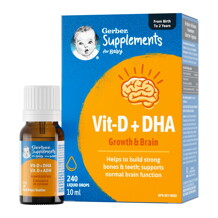
Why are vitamin D drops important for infants?
Today more than ever we are hearing about the importance of Vitamin D for babies’ healthy growth and development. Find out what it is about Vitamin D that makes it so important for infants and toddlers and whether it should be supplemented in your baby’s diet.
Why is Vitamin D important for babies?
Vitamin D is important for little growing bodies for a variety of reasons.
Growth and muscle maintenance
Firstly, vitamin D assists with the absorption of calcium and helps infants grow strong bones and teeth. Vitamin D also plays a role in maintaining your little one’s muscle function.
Brain and immune system development
Not only that, studies of vitamin D show that the benefits go beyond bones, teeth, and muscles. In fact, vitamin D also plays a supportive role in the normal functioning of the immune system in children and adults.
Adequate vitamin D is therefore very important in all age groups. It is particularly important in the first years of life, when babies and children are experiencing rapid periods of growth. Babies who don’t get enough vitamin D are at risk of poor bone growth and development and rickets.
What are the main sources of Vitamin D for babies and toddlers?
Vitamin-enriched foods
Unlike other vitamins, only a small amount of Vitamin D comes from our diet. Foods, in general, are low in vitamin D, apart from some, mainly of animal origin, such as salmon, sardines, and eggs.
Among the vegetable sources, mushrooms can be mentioned. In Canada, vitamin D is found in dairy products, fortified soy milks, and margarines. It is not easy to consume the right amount of vitamin D, however, from diet alone.
Sunlight
Vitamin D is quite a unique vitamin as it can be produced directly by our body through exposure of the skin to direct sunlight. In fact, most of it is produced in this way. Canada is a northern country so there are times of the year when there is not enough sunlight.
As well, precautions to protect our skin from the sun’s ultraviolet rays, darker skin, and clothing all interfere with vitamin D production. Sun protection and reducing sun exposure for babies is important, also making it difficult for them to get their daily dose of vitamin D this way.
Vitamin D drops
For babies who are exclusively or partially breastfed, experts recommend a daily supplement of 400 IU of vitamin D. These supplements usually come in liquid form and are given to your baby every day as drops.
Talk to your doctor if you’re concerned about how much vitamin D your baby or toddler is getting.
Are vitamin D drops or supplements for babies necessary?
It can be difficult for infants and children to achieve adequate vitamin D intakes for various reasons, including:
- Breast milk is naturally low in vitamin D.
- Precautions to protect babies and young children from exposure to direct sun like sunscreen and clothing, are important
Babies should begin eating solid foods at around 6 months old, and vitamin D-rich foods (e.g., Oily fish, egg yolks, organ meat) are not commonly consumed regularly in early life.
How much vitamin D do babies need?
In Canada, experts recommend a daily supplement of 400 IU of vitamin D for exclusively and partially breastfed babies. Cow’s milk is fortified with vitamins A & D, so toddlers who consume 2 cups of whole cow’s milk per day will be getting enough vitamin D. If you are continuing to breastfeed your toddler, they should still get a vitamin D supplement.
Talk to your doctor about ways you can ensure that your little one is receiving enough vitamin D.
Do formula-fed babies need vitamin D drops?
Infant formulas contain vitamin D, so babies that are entirely formula-fed do not need a vitamin D supplement. Importantly, babies who are only partially formula-fed should be supplemented with vitamin D to make sure they are meeting their daily requirements.
What are signs of vitamin D deficiency in babies?
Babies who don’t receive enough vitamin D through foods or supplements are at risk of vitamin D deficiency. Without a supplement, the vitamin D stores that baby built up during pregnancy will become depleted.
Vitamin D deficiency can cause a serious condition called rickets, where the bones become soft and weak. You might notice that your baby’s motor skills development is delayed or their teeth take longer to come in. In walking toddlers, their legs may look bowed and in babies who crawl, they may get widening of the area above their wrist.
Remember, it's a good idea to talk to your baby's doctor if you are concerned about vitamin D deficiency and to inquire about vitamin D drops or supplements if you’re breastfeeding your baby or toddler.
How can Gerber® Supplements for Baby Vit-D + DHA help my baby?
Gerber Supplements for Baby Vitamin D + DHA drops provide the expert recommended daily dose of 400 IU of Vitamin D for exclusively and partially breastfed babies and help to build strong bones and teeth in infants and young children.
Gerber® Supplements for Baby are a daily vitamin D drop supplement that also contains DHA, an Omega-3 fatty acid, which supports normal brain function.
Features and benefits:
- Helps to build strong bones and teeth
- Source of Vitamin D, an important factor in babies’ normal growth and development
- Supports normal brain function in infants
- No flavour, colours, or sweeteners
- Convenient drops format
Learn more about gerber® supplements, vit-d and dha for baby:
References:
- Canadian Paediatric Society. Caring for Kids. Vitamin D. July 2021. Accessed April 2023. Vitamin D | Caring for kids (cps.ca)
- Health Canada, Canadian Paediatric Society, Dietitians of Canada, Public Health Agency of Canada, & Breastfeeding Committee for Canada. Nutrition for Healthy Term Infants: Recommendations from Birth to Six Months. 2012.
- Health Canada, Canadian Paediatric Society, Dietitians of Canada, & Breastfeeding Committee for Canada. Nutrition for Healthy Term Infants: Recommendations from Six to 24 Months. 2014.
- American Academy of Pediatrics. Healthychildren.org. Vitamin D Deficiency and Rickets. 2021. Vitamin D Deficiency and Rickets - HealthyChildren.org Accessed July 2023.



